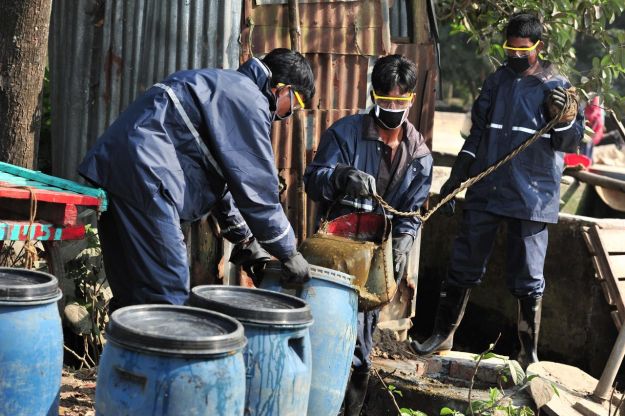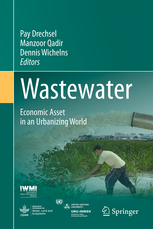Can cities transform wastewater into an asset?
It’s typically a time to think about water as pure, fresh and clean. But on World Water Day 2015, we get down and dirty with wastewater, and look at the work underway to change the way we treat this potentially valuable resource.
It chokes rivers and can pose serious risks to human health.
But wastewater could be key for urban planners seeking to make cities of the future more sustainable, according to a new book published this week: Wastewater: Economic Asset in an Urbanizing World.

Rich in nutrients and potentially a good source of energy, as well as water, the authors argue that wastewater could be transformed from an environmental burden to an economic asset. But this will only work if the process can be made financially viable.
It’s quite a big “if”. But there has probably never been a better time to try. Already over half of humans are urbanites, and most of the 2 billion people born between now and 2050 will live in cities. Finding ways to safely reuse the increasing amount of waste and wastewater these cities will generate is not only timely; it could prove critical.
That’s partly due to the prospect of increasing water scarcity. Changing diets and increasing demand for food, feed, fuel and fiber mean that we should expect growing pressure on limited freshwater supplies. Using wastewater could help fill the gap. It reduces stress on water resources in and around cities, and treating it is cheaper than creating new reservoirs. It’s also less energy-intensive than desalination or long-distance transfer, and helps avoid pollution.
But wastewater can also play a part in closing the so-called rural-urban nutrient loop. This currently sees nutrients drawn from the soil in the countryside and harbored in food crops, which are consumed in cities, with the resulting human waste in low income countries often dumped into waterways, septic tanks or cesspits. Reclaiming useful carbon, nitrogen, potassium and especially phosphorus from human waste, is not only technically feasible; it could also enable cities to produce their own organic fertilizer – perfect for the rapidly expanding urban agriculture sector.

But the pinch point is economics. If the costs involved in collecting, transporting and processing wastewater are not offset, there will be no incentive for processors to invest. The bright ideas could end up being flushed down the pan.
This means there will almost certainly need to be revisions to public policy too. If chemical fertilizers are heavily subsidized, the pricier phosphate pellets recovered from wastewater – in spite of their environmental benefits – probably won’t sell. Similarly, if freshwater is relatively cheap – again, as a result of subsidies – reclaimed water will need to be competitively priced or there will be little motivation for consumers to make the switch, or processors to take the plunge.
“Wastewater is only waste if we look at it that way,” said IWMI’s Pay Drechsel, one of the editors of the book. “But that’s only half the story. There are proven methods for transforming what we currently consider ‘waste’ into products that are environmentally and socially valuable.
“The final piece in the puzzle is finding ways to make these products economically valuable. While there is a myriad of books on technical aspects of wastewater management, this new book takes a closer look at the economics issue and possible value propositions wastewater use offers.”

There is unlikely to be an overnight fix though, according to one of the authors Manzoor Qadir, of United Nations University – Institute for Water, Environment and Health (UNU-INWEH). “A major challenge is the lack of attention being paid to implementing interim solutions to wastewater collection, treatment, and resource recovery and reuse until wastewater treatment capacity is largely achieved, particularly in low- and middle-income countries,” he said. “This may take years or even decades.”
“It is important to trigger action on the ground to change public perceptions of wastewater and government policies on the issue. This will help remove barriers to wastewater-based resource recovery and reuse. For this to happen, the private sector needs to be aggressively involved, along with the willingness of governments and the public to pay for wastewater management systems.”
Aimed at policymakers, the private sector and the general public, Wastewater… looks at the options and the bottlenecks associated with introducing financial and economic analysis into the use of wastewater, and ways to recover the costs involved in transforming it into a valuable product.
The book includes:
- An overview of wastewater and fecal sludge generation, treatment and use in agriculture globally, and related health and environmental risks
- The socio-economics of wastewater use, perceptions and institutional challenges, and how sustainable reuse of wastewater might be achieved.
- The costs and benefits of water reuse in different sectors.
- A major section on cost recovery options and business models supporting water, nutrient and/or energy recovery and reuse
“This book provides compelling evidence and real solutions for the new ‘resource from waste’ approach that is transforming sanitation, boosting livelihoods, and strengthening urban resilience”. Christopher Scott, Professor and Distinguished Scholar, University of Arizona
“This book shows how innovative business thinking and partnerships around resource recovery and reuse fit well within an inclusive green economy and climate change adaptation and mitigation strategies”. Akiça Bahri, Coordinator of the African Water Facility, Tunisia, and award-winning researcher
This work is supported by the CGIAR Research Program on Water, Land and Ecosystems (WLE).
About the book:
Drechsel, Pay, Qadir, Manzoor, Wichelns, Dennis (Eds.) 2015. Wastewater: Economic Asset in an Urbanizing World. Springer. 282 p. 45 illus., 10 illus. in color.


